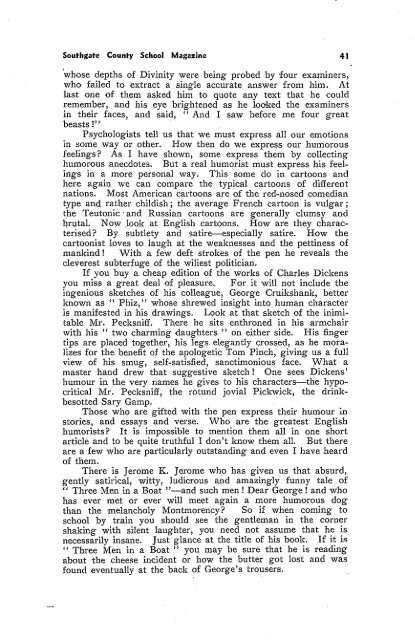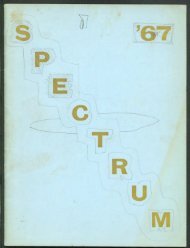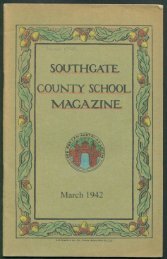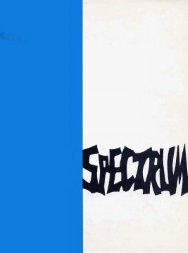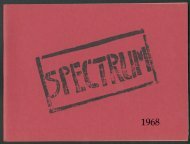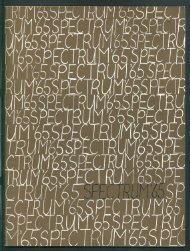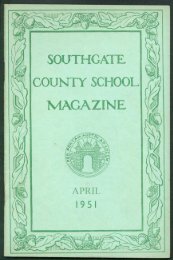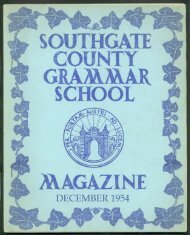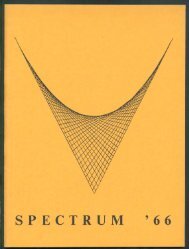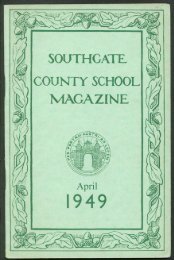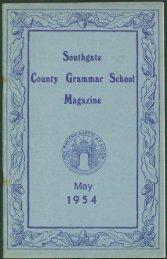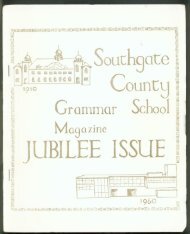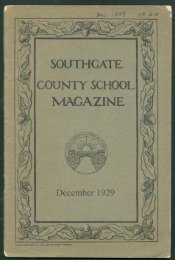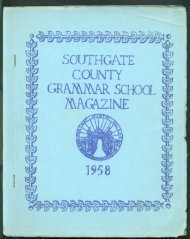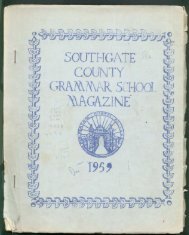No 34 - December 1937 - Southgate County School
No 34 - December 1937 - Southgate County School
No 34 - December 1937 - Southgate County School
Create successful ePaper yourself
Turn your PDF publications into a flip-book with our unique Google optimized e-Paper software.
<strong>Southgate</strong> <strong>County</strong> <strong>School</strong> Magazine 41<br />
whose depths of Divinity were being probed by four examiners,<br />
who failed to extract a single accurate answer from him. At<br />
last one of them asked him to quote any text that he could<br />
remember, and his eye brightened as he looked the examiners<br />
in their faces, and said, " And I saw before me four great<br />
beasts!"<br />
Psychologists tell us that we must express all our emotions<br />
in some way or other. How then do we express our humorous<br />
feelings? As I have shown, some express them by collecting<br />
humorous anecdotes. But a real humorist must express his feelings<br />
in a more personal way. This some do in cartoons and<br />
here again we can compare the typical cartoons of different<br />
nations. Most American cartoons are of the red-nosed comedian<br />
type and rather childish; the average French cartoon is vulgar;<br />
the Teutonic • and Russian cartoons are generally clumsy and<br />
brutal. <strong>No</strong>w look at English cartoons. How are they characterised?<br />
By subtlety and satire—especially satire. How the<br />
cartoonist loves to laugh at the weaknesses and the pettiness of<br />
mankind! With a few deft strokes of the pen he reveals the<br />
cleverest subterfuge of the wiliest politician.<br />
If you buy a cheap edition of the works of Charles Dickens<br />
you miss a great deal of pleasure. For it will not include the<br />
ingenious sketches of his colleague, George Cruikshank, better<br />
known as " Phiz," whose shrewed insight into human character<br />
is manifested in his drawings. Look at that sketch of the inimitable<br />
Mr. Pecksniff. There he sits enthroned in his armchair<br />
with his " two charming daughters " on either side. His finger<br />
tips are placed together, his legs elegantly crossed, as he moralizes<br />
for the benefit of the apologetic Tom Pinch, giving us a full<br />
view of his smug, self-satisfied, sanctimonious face. What a<br />
master hand drew that suggestive sketch! One sees Dickens'<br />
humour in the very names he gives to his characters—the hypocritical<br />
Mr. Pecksniff, the rotund jovial Pickwick, the drinkbesotted<br />
Sary Gamp.<br />
Those who are gifted with the pen express their humour in<br />
stories, and essays and verse. Who are the greatest English<br />
humorists? It is impossible to mention them all in one short<br />
article and to be quite truthful I don't know them all. But there<br />
are a few who are particularly outstanding and even I have heard<br />
of them.<br />
There is Jerome K. Jerome who has given us that absurd,<br />
gently satirical, witty, ludicrous and amazingly funny tale of<br />
'' Three Men in a Boat ''—and such men ! Dear George ! and who<br />
has ever met or ever will meet again a more humorous dog<br />
than the melancholy Montmorehcy? So if when coming to<br />
school by train you should see the gentleman in the corner<br />
shaking with silent laughter, you need not assume that he is<br />
necessarily insane. Just glance at the title of his book. If it is<br />
" Three Men in a Boat " you may be sure that he is reading<br />
about the cheese incident or how the butter got lost and was<br />
found eventually at the back of George's trousers.


